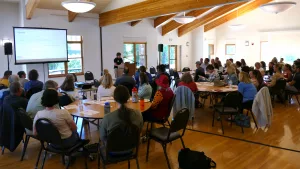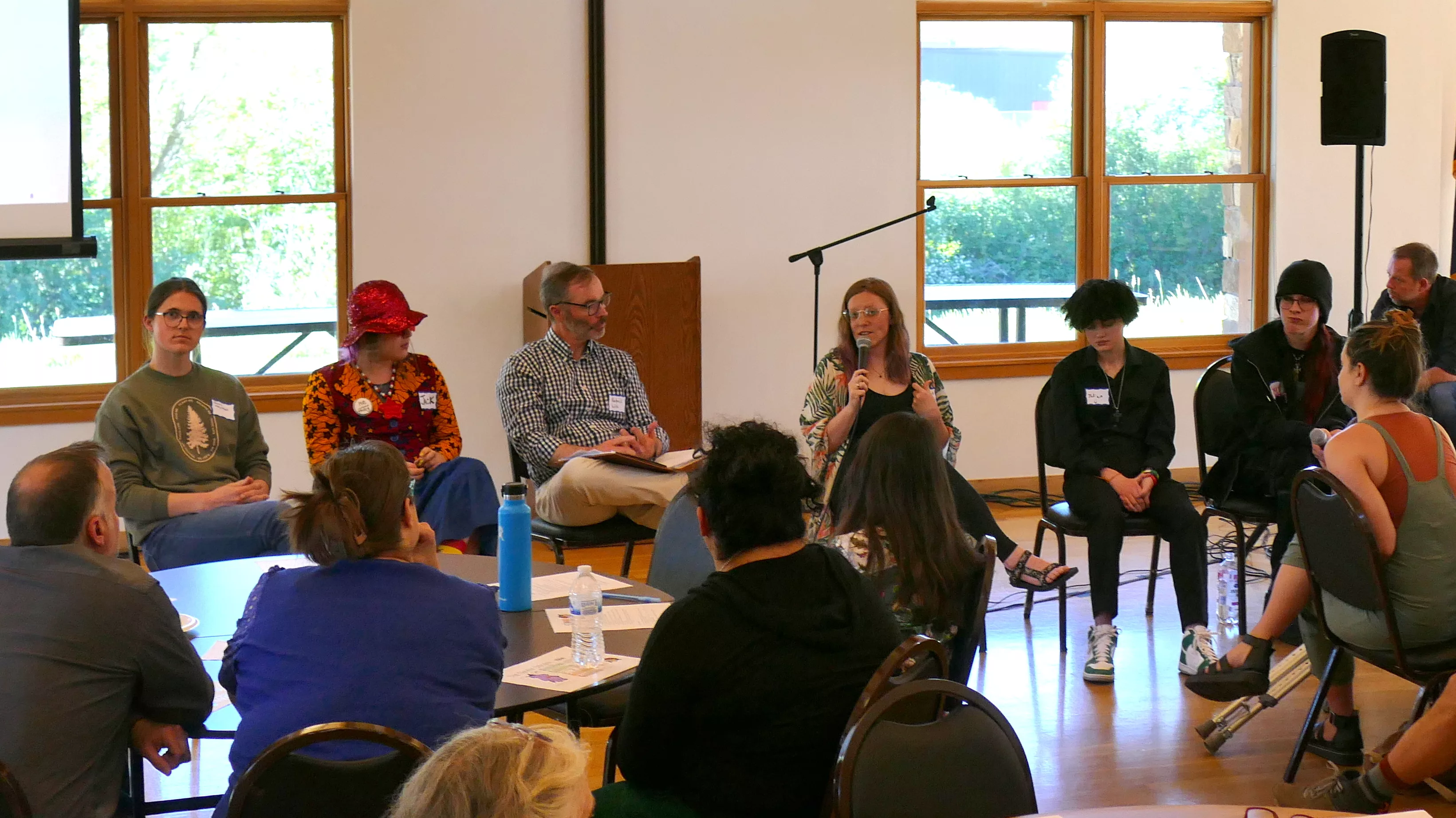
By Shannon Lukens.
Transgender youth and adults in the community was the subject of a discussion at the Community Center Tuesday evening. It was hosted by STAND, which is Steamboat Team to Disrupt Antisemitism and Discrimination. Tuesday’s meeting was called, “Say my Name: Becoming an Ally for Transgender Youth.” The focus of the meeting was stories and experiences of transgender youth in our community.

Duke (he/him) started off the meeting by explaining terms and words for the transgender community. Duke will be a junior at SSHS in the fall. Here is that speech.
“Hi, everyone, my name’s Duke, I use he/him pronouns, I’m on the Queer futures youth advisory board, and I’m here today to give everyone some information about interacting with trans people and what it means to be trans. This information will be pretty introductory, but hopefully a lot of people can learn something new!
- Gender Identity- A person’s internal sense of being a man, a woman, or something else
- Sex- A person’s biological status as male or female- what’s seen on birth certificates, driver’s licenses, etc.
- Sexuality- who a person is attracted to (this is sometimes confused or conflated with gender identity, but they are two separate identities)
- Transgender- someone whose gender identity doesn’t match with the one they were assigned at birth
- Cisgender- Basically just not-transgender, a person who identifies with their gender assigned at birth
- Trans man- someone who was born female but identifies as a man
- Trans woman- someone born male who identifies as a woman
- Non-binary- someone who identifies with a gender that is not specifically man or woman
- Misgender- Referring to someone by the wrong pronouns- can happen to both cis and trans people
- Coming out- When a person tells someone their sexuality or gender identity
- Outing- Telling someone else about a person’s sexuality or gender identity without their permission or approval. This can be purposeful or accidental and is at best uncomfortable and at worse dangerous
- Passing- When someone is perceived as the gender they identify as
How to refer to trans people:
Talking about them before they came out- as a general rule, you should always use a trans person’s chosen name and pronouns, regardless of if they were out to you when the story took place. Pay attention to the actual content of what you’re saying as well- it’s best to avoid topics that could out them or be uncomfortable or embarrassing now.
Introducing them to others or talking about them when they’re not present- the most important thing is to use the person’s correct name and pronouns. Unless you were given explicit permission to tell someone, don’t mention that they’re trans! Trans people don’t want to be known as your trans friend, and they have the right to tell new people on their own time, if ever.
What to say when a trans person comes out to you: different from if you knew them after they transitioned
Let’s start with someone coming out to you who hasn’t transitioned yet. You may want to start by thanking that person- coming out is often stressful, even if they know you will support them. If the person doesn’t tell you as they are coming out, ask them what name and pronouns they want to be called. It’s important to remember that this is the same person you’ve known the whole time- they just trust you enough to share more about themselves. It’s okay to be curious, so long as you’re respectful about any questions. Make sure to give them a way out of answering- you can always do some googling later. Avoid any questions about sexuality or their bodies. Depending on how close you are to the person who came out to you, the conversations you have about their identity may differ. If they’re an acquaintance or friend, they may prefer to let you know about their name change and pronouns and leave it at that. If they’re closer, such as an immediate family member or significant other, they may want to have conversations about future steps in their transition- let them come to you on their own time. The most important thing is that you are there for them.
Often, trans people come out to people in phases- maybe they tell close friends and family first, before moving out to acquaintances and people at work or school. For this reason, it’s important to ask someone who just came out to you when it’s appropriate to use their chosen name and pronouns and respect that. If you’re close to the person, it may be difficult to misgender them purposefully, but it is a better alternative to outing them to people who may not be accepting, or whom they just aren’t ready to tell yet.
If a person tells you they’re trans when they’ve already been passing to you, it’s a little simpler. You’ve already been using their correct name and pronouns, so you don’t have to mention that- just continue as you have been. Again, thanking them and telling them that you support them is always a good option.
What to do when you misgender someone
The best thing to do in a situation where you accidentally misgender someone is to quickly apologize, correct yourself, and move on. Just a quick, sorry, they, is a great response. It can be tempting to over apologize, but this will just make the situation more uncomfortable for everyone, especially in a large group where some people might not know they are trans. Trans people understand that other people are human, and it can be difficult sometimes to break old habits.
Common ways people transition (Social, legal, medical)
There are three major ways people transition. A trans person may choose to do all or some of these things, but none are a requirement for a trans person.
- The first is Socially transitioning– a person may change their name and pronouns, dress differently, and tell people about their identity.
- Medically transitioning- this can include taking hormone blockers to prevent puberty (for youth), beginning hormone replacement therapy (HRT), or getting surgeries so their bodies align more with their identities. This is often a long and expensive process, and it doesn’t happen overnight. A common myth about trans people is that the majority regret gender affirming healthcare, when in actuality regret rates are very low. According to the National Institute of Health, less than 1% of both trans men and women regret gender-affirming procedures.
- Legally transitioning- this mainly consists of changing the legal name and indicated sex of a trans person, on everything from bank accounts to IDs.
Moving on to a darker topic -Transphobia and discrimination
Transphobia is prejudice against transgender people. This, like other forms of discrimination, can occur on both an individual and structural level. Examples of transphobia by an individual are purposefully misgendering someone (calling them the wrong pronouns), using derogatory language to refer to trans people (like “weird” or “mentally ill”), suggesting a person’s identity as trans is a “phase”, implying that trans people are dangerous to children, outing someone as trans, refusing to sit with/talk to/interact with a person because they’re transgender, or bullying/harassing (or even assaulting) a person because of their identity. These are more extreme examples, and someone doing these is likely to not care if they are harming trans people. However, there are more subtle ways people can be transphobic, even if they want to support trans people or are not trying to be disrespectful. Saying things like “I would never have guessed you were trans” or “She’s so pretty for a trans woman” may seem like compliments, but they’re backhanded because there’s no one way trans people look. If you don’t personally know a trans person (or think you don’t), this may seem a bit abstract. But transphobia often culminates in violence. Trans people are four times more likely than cis people to be victims of violent crime, numbers that increase when a trans person is part of another minority group. Trans youth also experience bullying at a greater rate than cisgender peers- around 40% of trans middle and high school students report harassment in school compared to 20% of general students.
There’s also structural transphobia, which has unfortunately been on the rise in recent years. This can include laws that prevent trans people from using the bathroom that matches their gender identity, policies banning teaching queer history in schools, or legislation preventing trans people from receiving gender-affirming care. This past year, 87 of the 600+ anti-trans bills introduced in the US were signed into law. Policies like these come from widespread misinformation about trnasgender people and healthcare that are not backed in science or fact. In 2023, the American Medical Association passed a resolution to protect care for trans youth, noting “it is the responsibility of the medical community to speak out in support of evidence-based care. Medical decisions should be made by patients, their relatives and health care providers, not politicians.” This resolution was cosponsored by a number of major medical associations, including the American Academy of Pediatrics, the American Society for Reproductive Medicine, and the American College of Physicians.
While sometimes dealing with the amount of trans hate can be stressful, the most important thing you can do for trans people in your life is be there for them. Coming to events like these is a great start, but supporting local pride, keeping up with the news, and learning more about queer history and current events are ways you can show trans people in you life you care about them.”

Raven (he/they) spoke and said, when it comes to someone transgender, “love them like anyone else.”
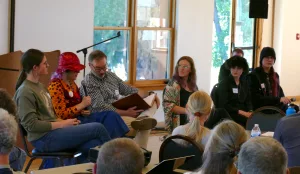
There was also a panel discussion on “what the community should know.” Here are some of those comments.
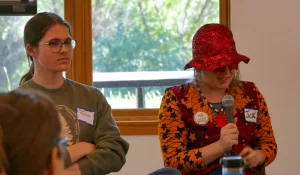
Quinn (they/them and on the left) said, “We’re the same as you. We are all the same. It’s disheartening to see a bunch of young people growing up to hate other people.”
Jack (he/they/it and on the right) said there has been discrimination and bullying locally. Things are better though, because of Yampa Valley Pride and the Queer Futures groups. Jack said, “Using someone’s correct pronouns is basic human decency.” Jack added that he “wants to get to a place where trans kids are not wanting to die.”
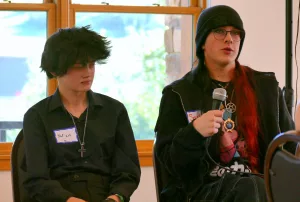
Soup (she/her and on the right) said she often feels scared to exist, and that “we’re just regular people.” She was sexually harassed in middle school, and added, “There is a unique beauty to being transgender that a lot of people don’t see.” Soup has hope for the future that “this whole obsession with trans people eventually passes, like every minority group that has been through the ringer at some point in history.” She said she hopes the stigma can eventually be lifted. “Hopefully, we can move past the need to hate someone because they are different from you.”
Julian (he/him and on the left) said it is hard to feel so dehumanized, adding he, “hopes we can create a safe environment for us because it really does suck sometimes.”

